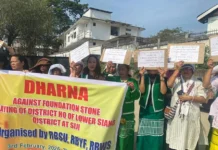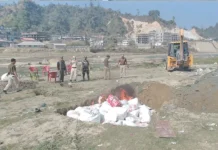RONO HILLS, 16 Jun: Rajiv Gandhi University’s (RGU) Tribal Research Institute (TRI) here has completed eight major research projects, focused on the indigenous people of Arunachal Pradesh, for the 2022-’23 period.
Informing that the projects were sponsored by the social justice, empowerment & tribal affairs (SJETA) department, the university informed in a release that “the expedition of the projects involved senior faculties and researchers from the sociology, anthropology and economics departments of RGU’s Arunachal Institute of Tribal Studies, and the Don Bosco College, Itanagar.”
The projects, which were completed under the guidance of RGU’S Sociology Associate Professor Dr Bikash Bage, will be beneficial to other researchers and scholars who seek more information about Arunachal, as these will be made available on various Google and other online digital platforms, the release stated.
“The union tribal affairs ministry has already uploaded the same in the digital repository at the national level,” it said, adding that “the main findings of these projects would pave the major process of facilitating the policies and programme frameworks, especially for Arunachal Pradesh.”
The completed projects are: ‘Tribal youths and employment avenues in Ziro valley in Arunachal Pradesh’; ‘Sanitation among the ST of Papum Pare district of Arunachal Pradesh – A case study of Swachh Bharat Mission’;
‘Empowerment through education: A study of the Adi tribe of East Siang district, Arunachal Pradesh’; ‘Role of education in social development among tribal of Arunachal Pradesh: A case study’; ‘Mental health and help seeking behaviour among the youths of Arunachal Pradesh’; ‘An understanding and documentation of dynamics in customary laws: An anthropological study among Nah women of Taksing circle, Arunachal Pradesh’; ‘Archaeological exploration in Arunachal Pradesh’; and ‘Documentation and dissemination of folktales of Arunachal Pradesh’.
“The research projects are original works, and it is confirmed that these works have not been submitted anywhere else. These research projects that have been submitted are the results of independent studies in the research area(s) and are free of plagiarism. All sources from which the excerpts were taken have been cited and duly acknowledged,” the release said, adding that the hard copies of the research works were submitted to the SJETA department on 15 June.



